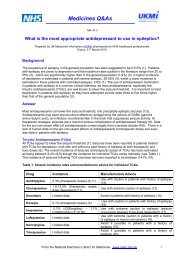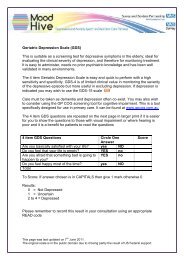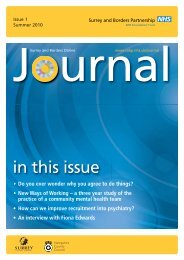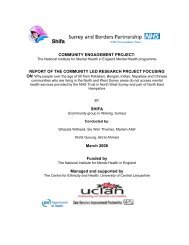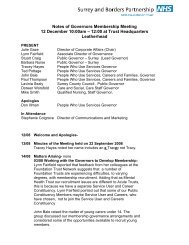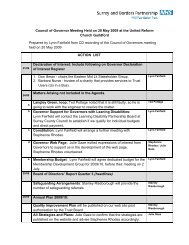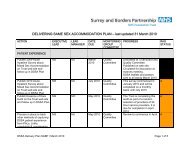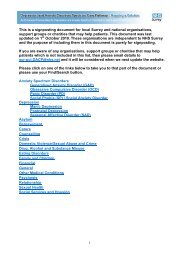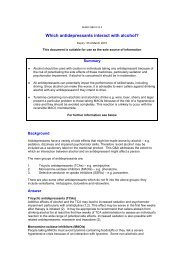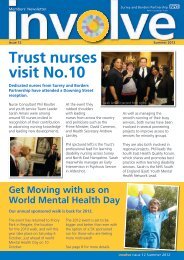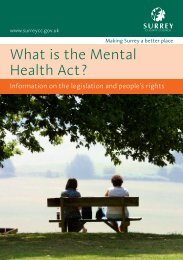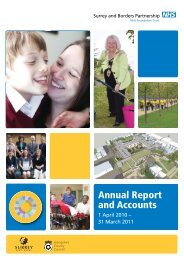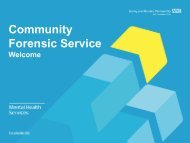DVLA "at a glance" fitness to drive - Heart Rhythm UK
DVLA "at a glance" fitness to drive - Heart Rhythm UK
DVLA "at a glance" fitness to drive - Heart Rhythm UK
Create successful ePaper yourself
Turn your PDF publications into a flip-book with our unique Google optimized e-Paper software.
-The applicant or licence holder must notify <strong>DVLA</strong> unless st<strong>at</strong>ed otherwise in the text<br />
Important Note.<br />
Appendix<br />
PSYCHIATRIC NOTES<br />
Psychi<strong>at</strong>ric conditions not normally requiring notific<strong>at</strong>ion, e.g. e<strong>at</strong>ing disorders, or those conditions which do not fit<br />
ne<strong>at</strong>ly in<strong>to</strong> the aforementioned classific<strong>at</strong>ion will need <strong>to</strong> be reported <strong>to</strong> <strong>DVLA</strong> if causing or felt likely <strong>to</strong> cause<br />
symp<strong>to</strong>ms affecting safe driving. These would include for example any impairment of consciousness or awareness, any<br />
increased liability <strong>to</strong> distraction or symp<strong>to</strong>ms affecting the safe oper<strong>at</strong>ion of vehicle controls. The p<strong>at</strong>ient should be<br />
advised <strong>to</strong> declare both the condition and symp<strong>to</strong>ms of concern.<br />
It is the rel<strong>at</strong>ionship of symp<strong>to</strong>ms <strong>to</strong> driving th<strong>at</strong> is of importance.<br />
• The 2 nd EC Directive requires member st<strong>at</strong>es <strong>to</strong> set minimum medical standards of <strong>fitness</strong> <strong>to</strong> <strong>drive</strong> and sets out the<br />
requirements for mental health in broad terms.<br />
• The Directive makes a clear distinction between the standards needed for Group 1 (cars and mo<strong>to</strong>rcycles) and Group 2<br />
(lorries and buses) licences. The standards for the l<strong>at</strong>ter being more stringent due <strong>to</strong> the size of vehicle and the gre<strong>at</strong>er<br />
time spent <strong>at</strong> the wheel during the course of the occup<strong>at</strong>ion.<br />
• Severe mental disorder is a prescribed disability for the purposes of Section 92 of the Road Traffic Act 1988.<br />
Regul<strong>at</strong>ions define “severe mental disorder” as including mental illness, arrested or incomplete development of the<br />
mind, psychop<strong>at</strong>hic disorder or severe impairment of intelligence or social functioning. The standards must reflect, not<br />
only the need for an improvement in the mental st<strong>at</strong>e, but also a period of stability, such th<strong>at</strong> the risk of relapse can be<br />
assessed should the p<strong>at</strong>ient fail <strong>to</strong> recognise any deterior<strong>at</strong>ion.<br />
• Misuse of or dependency on alcohol or drugs will require the standards in this chapter <strong>to</strong> be considered in conjunction<br />
with those of Chapter 5 of this public<strong>at</strong>ion.<br />
MEDICATION<br />
• Section 4 of the Road Traffic Act 1988 does not differenti<strong>at</strong>e between illicit or prescribed drugs. Therefore, any person<br />
who is driving or <strong>at</strong>tempting <strong>to</strong> <strong>drive</strong> on the public highway, or other public place whilst unfit due <strong>to</strong> any drug, is liable<br />
<strong>to</strong> prosecution.<br />
• All drugs acting on the central nervous system can impair alertness, concentr<strong>at</strong>ion and driving performance. This is<br />
particularly so <strong>at</strong> initi<strong>at</strong>ion of tre<strong>at</strong>ment, or soon after and when dosage is being increased. Driving must cease if<br />
adversely affected.<br />
• The older tricyclic antidepressants can have pronounced anticholinergic and antihistaminic effects, which may impair<br />
driving. The more modern antidepressants may have fewer adverse effects. These consider<strong>at</strong>ions need <strong>to</strong> be taken<br />
in<strong>to</strong> account when planning the tre<strong>at</strong>ment of a p<strong>at</strong>ient who is a professional <strong>drive</strong>r.<br />
• Anti-psychotic drugs, including the depot prepar<strong>at</strong>ions, can cause mo<strong>to</strong>r or extrapyramidal effects as well as sed<strong>at</strong>ion or<br />
poor concentr<strong>at</strong>ion, which may, either alone or in combin<strong>at</strong>ion, be sufficient <strong>to</strong> impair driving. Careful clinical<br />
assessment is required.<br />
• The epilep<strong>to</strong>genic potential of psychotropic medic<strong>at</strong>ion should be considered particularly when p<strong>at</strong>ients are professional<br />
<strong>drive</strong>rs.<br />
• Benzodiazepines are the most likely psychotropic medic<strong>at</strong>ion <strong>to</strong> impair driving performance, particularly the long acting<br />
compounds. Alcohol will potenti<strong>at</strong>e the effects.<br />
• Doc<strong>to</strong>rs have a duty of care <strong>to</strong> advise their p<strong>at</strong>ients of the potential dangers of adverse effects from medic<strong>at</strong>ion and<br />
interactions with other substances, especially alcohol.<br />
• Drivers with psychi<strong>at</strong>ric illnesses are often safer when well and on regular psychotropic medic<strong>at</strong>ion than when they are<br />
ill. Inadequ<strong>at</strong>e tre<strong>at</strong>ment or irregular compliance may render a <strong>drive</strong>r impaired by both the illness and medic<strong>at</strong>ion.<br />
CONFIDENTIALITY<br />
When a p<strong>at</strong>ient has a condition which makes driving unsafe and the p<strong>at</strong>ient is either unable <strong>to</strong> appreci<strong>at</strong>e this, or refuses <strong>to</strong><br />
cease driving, GMC guidelines advise breaking confidentiality and informing <strong>DVLA</strong>. [GMC Confidentiality Handbook]<br />
PATIENTS UNDER SECTION 17 OF THE MENTAL HEALTH ACT<br />
Before resuming driving, <strong>drive</strong>rs must be able <strong>to</strong> s<strong>at</strong>isfy the standards of <strong>fitness</strong> for their respective conditions and be free<br />
from any effects of medic<strong>at</strong>ion, which will affect driving adversely.<br />
34



